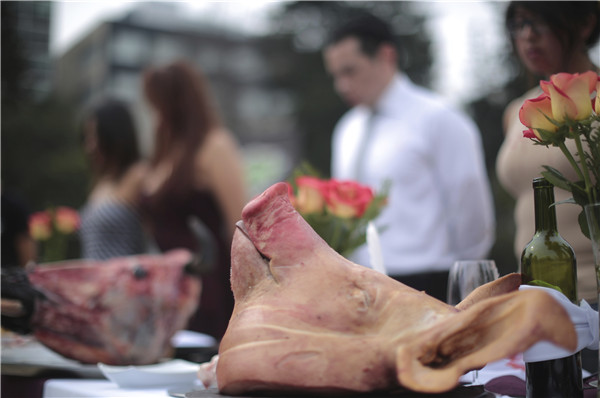Eating less meat is a win-win choice
 |
|
Detail of a pig head during a performance of Animal Heroes NGO to denounce the excessive consumption of meat during the Christmas season at Revolucion monument on December 21, 2015 in Mexico City, Mexico. [Photo/CFP] |
"There's much more meat consumed in the cities, and the growth potential largely remains in the rural areas," said China's Academy of Agricultural Science researcher Cheng Guangyan in an interview with the Telegraph in 2012.
The disproportionate meat consumption suggests that while rural meat consumption in China is to see a steady rise, urban Chinese should eat less meat to stay fit and live a more sustainable life.
"Some people eat a lot of meat, say, more than half a kilo in a meal, which is rather unhealthy," said Zhu Huilian, public health professor in Sun Yat-Sen University in South China's Guangdong province.
"Too much meat ingestion will change the flora condition in the gut, which make people rely on a meat diet, and increase risks of getting diseases like heart diseases and intestinal cancer," she said.
Zhu's argument was proved as early as 2007, when America's National Institute drew a 10-year follow-up health study, that red and processed meat intakes were associated with modest increases in total mortality, cancer mortality and CVD mortality.
In addition to increasing disease risks, the consumption of meat has resulted in greater consumption in grains. Currently, China has to bulk import products to feed the animals and meet the demand of meat consumption of its residents, as it takes seven pounds of grain for an ox to gain a pound of weight, five pounds to gain a pound of pork and two pounds chicken.
The Telegraph reports that in 2012, China imported around 50 million tons of soy beans, a vital ingredient in animal feed. And a 2014 Forbes report said that China purchased more than 60 percent of the soybeans available for export in the world.
"If we cut down 30 grams of meat consumption every day, we may be able to reduce at least one kilogram of grain consumption, and also reduce clean drinking water consumption and manure use, therefore ease burden of the planet," said Huo.
As reported, by 2050, the global grain acreage will increase by 42 percent on a 2009 basis, at the sacrifice of one tenth of the rainforest and endangering species.
Related:
















